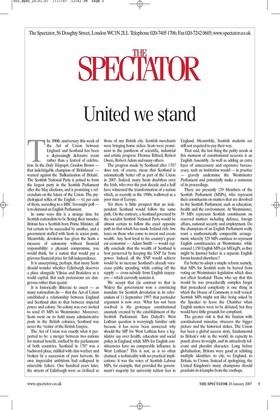United we stand
The 300th anniversary this week of the Act of Union between England and Scotland has been a depressingly defensive event rather than a festival of celebration. In the Daily Telegraph, Gordon Brown — that indefatigable champion of 'Britishness' — warned against the 'Balkanisation of Britain'. The Scottish National Party is poised to form the largest party in the Scottish Parliament after the May elections, and is promising a referendum on the future of the Union. The psychological reflex of the English — 61 per cent of them, according to a BBC Newsnight poll — is to demand an English Parliament.
In some ways this is a strange time for Scottish nationalists to be flexing their muscles. Britain has a Scottish-born Prime Minister, all but certain to be succeeded by another, and a government stuffed with Scots in senior posts. Meanwhile, devolution has given the Scots a measure of autonomy without financial responsibility: a pleasant compromise, you would think, for a nation that would pay a grievous financial price for full independence.
It is unsurprising, perhaps, that many Scots should wonder whether Edinburgh deserves a place alongside Vilnius and Bratislava as a world capital. But such pretensions are dangerous rather than quaint.
It is historically illiterate to assert — as many nationalists do — that the Act of Union established a relationship between England and Scotland akin to that between imperial power and colony. No colony was ever invited to send 45 MPs to Westminster. Moreover, Scots went on to hold many administrative posts in the British colonies; Scotland was never the 'victim' of the British Empire The Act of Union was exactly what it purported to be: a merger between two nations for mutual benefit, ratified by the parliaments of both countries. Scotland in 1707 was a backward place, riddled with clan warfare and broken by a succession of poor harvests. Its own imperialist ambitions had collapsed in miserable failure. One hundred years later, the streets of Edinburgh were as civilised as those of any British city. Scottish merchants were bringing home riches. Scots were prominent in the pantheon of scientific, industrial and artistic progress: Thomas Telford, Robert Owen, Robert Adam and many others.
The progress made by Scotland after 1707 does not, of course, mean that Scotland is axiomatically better off as part of the Union in 2007. Indeed, many Scots doubtless envy the Irish, who over the past decade and a half have witnessed the transformation of a nation which, as recently as the 1980s, wallowed as a poor man of Europe.
Yet there is little prospect that an independent Scotland would follow the same path. On the contrary, a Scotland governed by the socialist Scottish National Party would be almost certain to follow the exact opposite path to that which has made Ireland rich: low taxes on those who come to invest and create wealth. Any Scot loyal to his country's greatest economist — Adam Smith — would rapidly conclude that the wealth of Scotland is best preserved by keeping the SNP far from power. Indeed, all the SNP would achieve would be to increase Scotland's already voracious public spending, while cutting off the supply — cross-subsidy from English taxpayers — which currently sustains it.
We accept that (in contrast to that in Wales) the government won a convincing mandate for Scottish devolution in its referendum of 11 September 1997: that particular argument is now over. What has not been resolved is the grotesque constitutional anomaly created by the establishment of the Scottish Parliament. Tam Dalyell's West Lothian question is wearyingly familiar only because it has never been answered: why should the MP for West Lothian have a legislative say over health, education and social policy in England, while MPs for English constituencies have no comparable influence in West Lothian? This is not, as is so often claimed, a technicality with no practical implications: it was the votes of Scottish Labour MPs, for example, that provided the government's majority for university tuition fees in England. Meanwhile, Scottish students are still not required to pay their way.
That said, the last thing the polity needs at this moment of constitutional neurosis is an English Assembly. As well as adding an extra layer of unnecessary and expensive bureaucracy, such an institution would — in practice — gravely undermine the Westminster Parliament and potentially make a nonsense of its proceedings.
There are presently 129 Members of the Scottish Parliament (MSPs), who represent their constituents on matters that are devolved to the Scottish Parliament, such as education, health and the environment. At Westminster, 59 MPs represent Scottish constituents on reserved matters including defence, foreign affairs, national security and employment. Do the champions of an English Parliament really want a mathematically comparable arrangement, whereby 529 MPs continue to represent English constituencies at Westminster, while around 1,150 English MPs (or MEngPs, as they might be known) bicker in a separate English forum located elsewhere?
Far better to adopt a simple reform: namely, that MPs for Scottish seats be barred from voting on Westminster legislation which does not affect Scotland. Those who say that this would be too procedurally complex forget that procedural complexity is one thing in which the House of Commons is well versed. Scottish MPs might not like being asked by the Speaker to leave the Chamber when English matters were to be debated, but they would have little grounds for complaint.
The greater risk is that the fixation with constitutional minutiae obscures the bigger picture and the historical stakes. The Union has been a global success story, fundamental to Britain's role in the world, its capacity to punch above its weight, and its attractively tolerant and pluralist character. Long before globalisation, Britons were good at relishing multiple identities: to city, to England, to Britain, to Crown. Instead of apologising, the United Kingdom's many champions should proclaim its triumphs from the rooftops.





















































 Previous page
Previous page